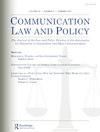第一修正案中“思想市场”的含义
IF 0.2
Q4 LAW
引用次数: 2
摘要
奥利弗·温德尔·霍姆斯(Oliver Wendell Holmes)和路易斯·布兰迪斯(Louis Brandeis。在第一修正案的案件中,最高法院法官不断引用他们发展起来的思想市场隐喻。它实现了真正的法律意义,特别是在言论自由法的某些领域,并在使现代言论自由法整个架构合理连贯和稳定方面具有重要意义。本文探讨了市场隐喻在现代言论自由法的三个离散领域的重要性:商业言论、政治竞选资金和侵权责任。虽然市场隐喻并不是唯一发挥重要影响的领域,但这三个例子尤其具有启发性,同时揭示了市场隐喻作为命令言论自由学说的说服工具的优势和劣势。然后,本文从广角角度考察了市场隐喻,认为它可以定义现代言论自由法的两个中心大陆分歧。这篇文章在很大程度上为目前的言论自由法提供了一个清晰、规范、令人信服的描述。本文章由计算机程序翻译,如有差异,请以英文原文为准。
The Meaning of the “Marketplace of Ideas” in First Amendment Law
The 1919 First Amendment opinions of Oliver Wendell Holmes and Louis Brandeis comprise the seminal texts in the cannon that now includes hundreds of decisions by the Supreme Court of the United States interpreting the core of the American free speech tradition. The marketplace of ideas metaphor they developed has been invoked constantly by Supreme Court justices in First Amendment cases. It has achieved genuine load-bearing legal significance, particularly in certain arenas of free speech law, and over-arching significance in rendering the entire architecture of modern free speech law reasonably coherent and stable. This essay explores the importance of the marketplace metaphor in three discrete areas of modern free speech law: commercial speech, political campaign finance, and tort liability. While by no means the only arenas in which the marketplace metaphor has exerted important influence, these three exemplars are especially illuminating, exposing at once the strengths and weaknesses of the marketplace metaphor as a persuasive tool for ordering free speech doctrines. The essay then examines the marketplace metaphor from a wide-angle lens, making the argument that it operates to define two of the central continental divides of modern free speech law. The essay goes a long way toward providing a descriptively clear and normatively convincing account of free speech law as it currently stands.
求助全文
通过发布文献求助,成功后即可免费获取论文全文。
去求助
来源期刊
CiteScore
0.60
自引率
33.30%
发文量
7
期刊介绍:
The societal, cultural, economic and political dimensions of communication, including the freedoms of speech and press, are undergoing dramatic global changes. The convergence of the mass media, telecommunications, and computers has raised important questions reflected in analyses of modern communication law, policy, and regulation. Serving as a forum for discussions of these continuing and emerging questions, Communication Law and Policy considers traditional and contemporary problems of freedom of expression and dissemination, including theoretical, conceptual and methodological issues inherent in the special conditions presented by new media and information technologies.

 求助内容:
求助内容: 应助结果提醒方式:
应助结果提醒方式:


